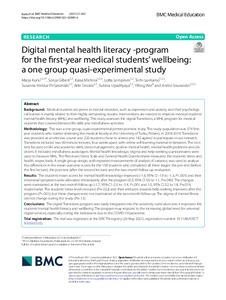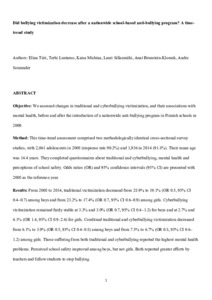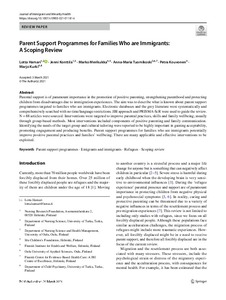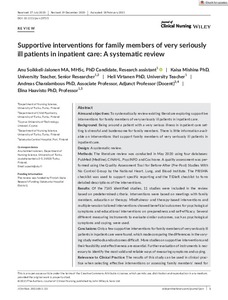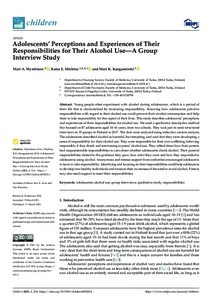Hae
Aineistot 11-20 / 21
Vanhemmuusohjelmien käytettävyys haavoittuvassa asemassa olevien vanhempien näkökulmasta - Integratiivinen kirjallisuuskatsaus
<p>Integratiivisen kirjallisuuskatsauksen tarkoituksena <a>oli kuvata lasten mielenterveys- ja käytösongelmien ennaltaehkäisyyn ja hoitoon tarkoitettujen vanhemmuusohjelmien käytettävyyttä haavoittuvassa asemassa olevien ...
Impact and Feasibility of Information Technology to Support Adolescent Well-Being and Mental Health at School: A Quasi-Experimental Study
<p>Purpose: Health-related behaviors that arise during adolescence can have important, sometimes lifelong, implications on a person's health. Psychiatric and neurodevelopmental diagnoses among minors have increased, and ...
How Do Adolescents Use Electronic Diaries? A Mixed-Methods Study Among Adolescents With Depressive Symptoms
Background: Depression in adolescence is common. Less than half of the adolescents with depression receive mental health care; furthermore, treatment tends to be suspended, and its success rates are low. There is a need ...
Digital mental health literacy-program for the first-year medical students' wellbeing: a one group quasi-experimental study
<p>Background <br></p><p>Medical students are prone to mental disorders, such as depression and anxiety, and their psychological burden is mainly related to their highly demanding studies. Interventions are needed to improve medical students' mental health literacy (MHL) and wellbeing. This study assessed the digital Transitions, a MHL program for medical students that covered blended life skills and mindfulness activities.<br></p><p>Methodology <br></p><p>This was a one group, quasi-experimental pretest-posttest study. The study population was 374 first-year students who started attending the medical faculty at the University of Turku, Finland, in 2018-2019. Transitions was provided as an elective course and 220 students chose to attend and 182 agreed to participate in our research. Transitions included two 60-minute lectures, four weeks apart, with online self-learning material in between. The content focused on life and academic skills, stress management, positive mental health, mental health problems and disorders. It included mindfulness audiotapes. Mental health knowledge, stigma and help-seeking questionnaires were used to measure MHL. The Perceived Stress Scale and General Health Questionnaire measured the students' stress and health, respectively. A single group design, with repeated measurements of analysis of variance, was used to analyze the differences in the mean outcome scores for the 158 students who completed all three stages: the pre-test (before the first lecture), the post-test (after the second lecture) and the two-month follow-up evaluation.<br></p><p>Results <br></p><p>The students' mean scores for mental health knowledge improved (-1.6, 95% Cl -1.9 to -1.3, P<.001) and their emotional symptoms were alleviated immediately after the program (0.5, 95% Cl 0.0 to 1.1, P=.040). The changes were maintained at the two-month follow up (-1.7, 95% Cl -2.0 to -1.4, P<.001 and 1.0, 95% Cl 0.2 to 1.8, P=.019, respectively). The students' stress levels reduced (P=.022) and their attitudes towards help-seeking improved after the program (P<.001), but these changes were not maintained at the two-month follow up. The stigma of mental illness did not change during the study (P=.13).Conclusions: The digital Transitions program was easily integrated into the university curriculum and it improved the students' mental health literacy and wellbeing. The program may respond to the increasing global need for universal digital services, especially during the lockdowns due to the COVID-19 pandemic.</p>...
Did Bullying Victimization Decrease After Nationwide School-Based Antibullying Program? A Time-Trend Study
<p>Objective<br>We assessed changes in traditional and cyberbullying victimization, and their associations with mental health, before and after the introduction of a nationwide antibullying program in Finnish schools in ...
Healthcare Professionals’ Perceptions of Psychosocial Support for Family Members in Palliative Care Inpatient Units – A Qualitative Descriptive Study
<p><strong>Aim: </strong>This study aimed to describe the psychosocial support healthcare professionals in specialist palliative inpatient units provide to family members of palliative care patients.</p><p><strong>Design ...
Parent Support Programmes for Families Who are Immigrants: A Scoping Review
Parental support is of paramount importance in the promotion of positive parenting, strengthening parenthood and protecting children from disadvantages due to immigration experiences. The aim was to describe what is known ...
Supportive interventions for family members of very seriously ill patients in inpatient care: A systematic review
Aims and objectives To systematically review existing literature exploring supportive interventions for family members of very seriously ill patients in inpatient care.<div><br /></div><div>Background Being around a patient ...
Adolescents’ Perceptions and Experiences of Their Responsibilities for Their Alcohol use—A Group Interview Study
<p>Young people often experiment with alcohol during adolescence, which is a
period of their life that is characterized by increasing
responsibility. Knowing how adolescents perceive responsibilities with
regard to ...
Public health nurses' experiences of assessing disruptive behaviour in children and supporting the use of an Internet‐based parent training programme
<div>
<div>
<h3> Background</h3>
<p>In Finland, although families generally receive
support from child health clinics, some ...


